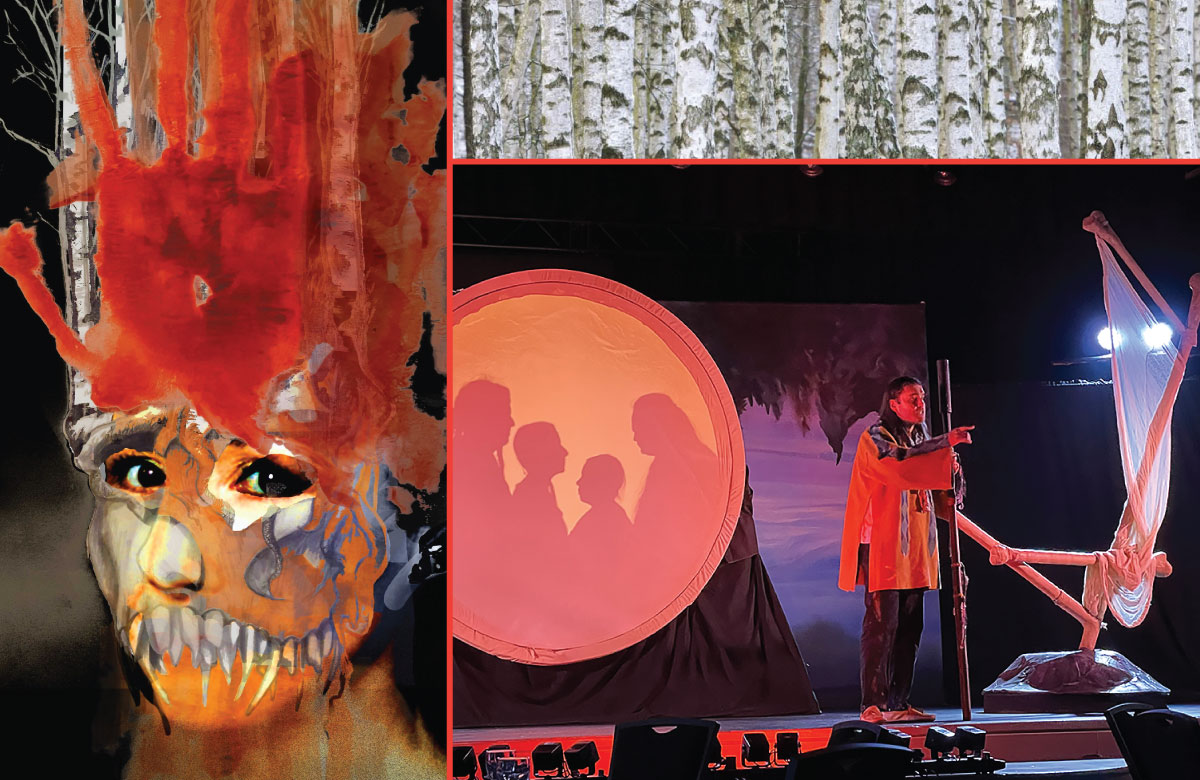
Featured Image: L- Poster for PawâkanMacbeth courtesy of akpiktheatre.com, R- Photo by Shannon Webb-Campbell
The first time I saw Akpik Theatre’s community retelling of Pawâkan Macbeth, co-presented by Neptune Theatre and Prismatic Arts Festival on October 5, 2023, my mind was spinning and heart was racing. Despite being a literary scholar, I’m not much of a Shakespearian, and I felt unsettled after seeing Shakespeare’s darkest play via Indigenous cosmology by renowned playwright, director and producer Reneltta Arluk. Perhaps it was the on-stage violence, bloodshed, or the fact I’ve never seen anything like it. Or maybe it was because I went to the performance alone.
When I was gifted the opportunity to see it again a week later in Membertou First Nation in Unama’ki (Cape Breton) as part of the National Gathering of Graduate Students 2023, I felt more grounded within the world of the play. There was also sense of kinship amongst fellow Indigenous audience members from across Turtle Island, and being seated together at round tables gathering over food and story. The shown itself was the same, but the experience of seeing Pawâkan Macbeth felt more connective in Membertou First Nation.
Director and playwright Reneltta Arluk, who is of Inuvialuit, Dene and Cree descent, not only leads her own Akpik Theatre Company in Yellowknife, but she is also the Director of Indigenous Arts at the Banff Centre for Arts and Creativity. Her Plains Cree takeover of Shakespeare’s Macbeth is wry, smart and transformational. During my second time seeing Pawâkan Macbeth, Arluk was in attendance, and spoke to the importance of bringing this work into community. Pawâkan Macbeth is a deeply feminist and matriarchal revisioning that was in part inspired by Arluk’s own grandmother, whom she shares her facial tattoos.
As a boundary-pushing theatrical production, Pawâkan Macbeth takes place pre-colonization, a period of time when Indigenous peoples had true autonomy, and back when the Plains Cree and Stoney Nakoda were fighting over trade, food, territory and supplies with the Blackfoot. Back when Indigenous peoples were deeply rooted in their stories, balanced by their cultures, connected to their communities and found wisdom in their own worldviews. During this era, Indigenous peoples’ spirits were as strong as their practices, a potency evoking both darkness and light.
Commissioned by The Stratford Festival, Pawâkan Macbeth is set in the 1870s, just as the Canadian government moves further west with Sir John A. MacDonald at the helm, and colonization casts its looming shadows across Turtle Island. The play is filled with grief and beauty simultaneously, and evokes the hardships colonization brought into our communities: intense fear, betrayal, greed and starvation. Pawâkan Macbeth doesn’t shy away from the bloodshed, pain or countless murders akin to Shakespeare’s well-known tale. The original Elizabethan-era Macbeth follows three witches who gather over a cauldron to tell the Scottish general he will become King, and his wife kills him, crowning her the new king and results in killing more people which erupts into civil war.
Pawâkan Macbeth overthrows the Bard’s rendition of Macbeth with the Wiyoyowak, who unlike the witches are coyote-like creatures that feed the insatiable Wihtiko, a cannibal spirit. The Wiyoyowak are more active – both physically in the story and on the stage – than Shakespeare’s witches, and establish the play as a fully Cree revisioning of Macbeth that honours Cree language, history and legends. Much like trio of witches who foretold Macbeth would become king, the Wiyoyowak deliver the prophecy that Mahcikosisan will become the leader of the band.
Through a terrifying journey of love, loss and coyote howling, Pawâkan Macbeth was fostered by Elders in the Treaty 6 community, the youth at the Chief Napaeweaw Comprehensive School in Alberta Frog Lake First Nation, and with Knowledge Keeper and Language consultant Darlene Auger and Jhaik Windyhair. Pawâkan Macbeth illuminates that with resurgence comes balance.
Pawâkan Macbeth stars an all Indigenous cast: Lisa Nasson from Millbrook First Nation. Mallory Amirault who is of mixed Mi’kmaq, Acadian white-settler heritage. JD Montrand is a Rocky Cree actor from Treaty 6 and Treaty 10 territory. Michell Saddleback who is a writer, actor and comedian from Samson Cree Nation. Spencer Streichert who is a queer actor who is of mixed Cree, Métis and European ancestry. As well as Aaron Wells from the Nuu-Chah-Nulth and Tsimpsian Nations of Northern British Columbia and English settler heritage.
The incredible costumes designed by queer Nehiya/Denesuline artist Logan Martin-Arcand and handmade by Elena Vandakurova bring the imaginative realms of the story to life. Pawâkan Macbeth also features a dynamic yet simple set design of Cree cosmology where the drum becomes the moon as well as a narrative device by Cimmeron Meyer.
Arluk’s Pawâkan Macbeth is an unforgettable and startling theatrical performance that could easily become its own sort of classic. As a Plains Cree story, Pawâkan Macbeth highlights the power that feeds the good light ultimately starves the evil spirits and owls.
Find out more here: http://akpiktheatre.com/









